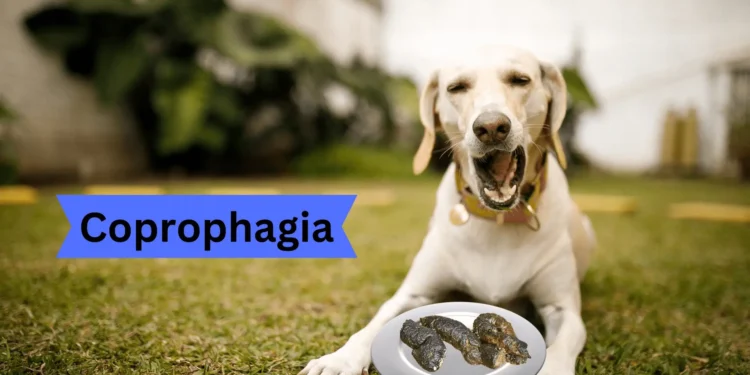Coprophagia, the act of dogs eating their own or other animals’ feces, is a behavior that baffles many pet owners. While it may seem repulsive, there are reasons behind it, and fortunately, there are ways to address it. In this guide, we’ll delve into practical solutions, home remedies, and expert tips to curb this unsavory habit and keep your furry friend healthy and happy. Let’s explore how to put an end to poop-eating once and for all!
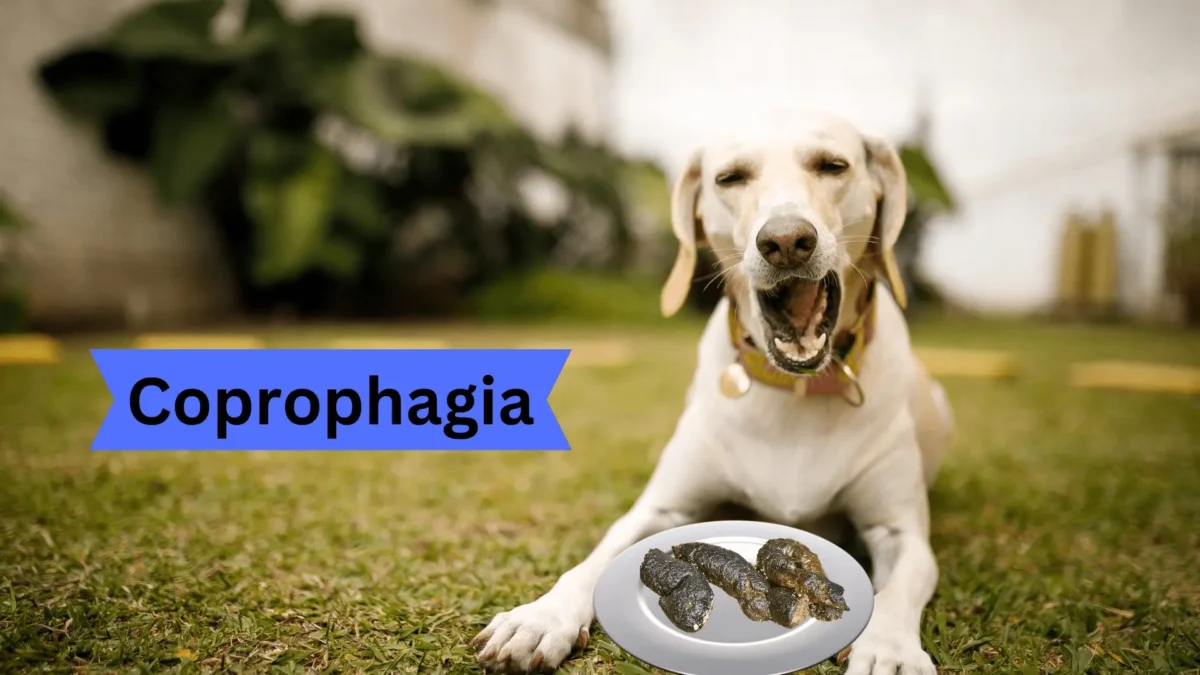
Table of Contents
Reasons Why Dogs Eat Poop: Understanding Coprophagia
Dogs are fascinating creatures with behaviors that sometimes leave us scratching our heads. One such puzzling behavior is coprophagia, the act of dogs consuming their own or other animals’ feces. While it may seem repulsive to us, there are reasons behind this behavior. Let’s explore why dogs engage in this curious habit and how we can address it.
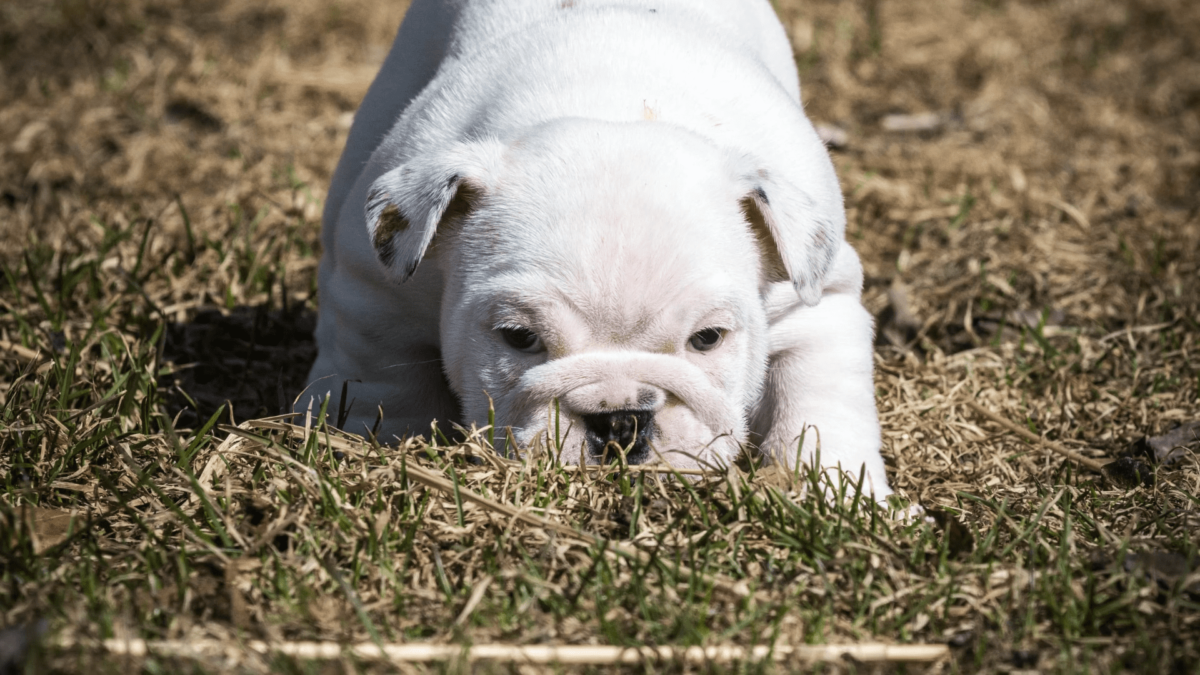
1.Why do dogs eat their own poop?
- Nutritional Instincts:
- Dogs evolved as scavengers, consuming whatever they found on the ground or in trash heaps.
- When lacking sufficient nutrients from their regular food, dogs may resort to eating poop to obtain essential elements.
- Vitamin B1 deficiency has been linked to an increased likelihood of coprophagia.
- Malabsorption Syndrome:
- Some dogs suffer from malabsorption syndrome, where they don’t fully absorb nutrients from their food in the small intestine.
- In response, dogs salvage leftover nutrients by consuming feces.
- If you suspect malabsorption, consult your veterinarian for proper diagnosis and treatment.
- Intestinal Parasites:
- Dogs with intestinal parasites may exhibit coprophagia.
- Parasites can disrupt nutrient absorption, leading dogs to seek additional nutrients from feces.
- Natural Instincts:
- Eating fresh stools may be an innate behavior inherited from ancestral canids.
- In nature, this behavior protects pack members from intestinal parasites occasionally present in den/rest areas.
- Different Sensibilities:
- What’s repulsive to humans isn’t necessarily gross from a dog’s perspective.
- Dogs evolved to scavenge and adapt to periodic adversity, including occasional food scarcity.
- Mother Pups and Cleaning:
- After giving birth, mother dogs lick their puppies to clean and nurture them.
- During this process, they may inadvertently ingest their pups’ feces.
- This behavior usually corrects itself as the puppies become more independent.
- Fear and Anxiety:
- Dogs that fear the consequences of soiling in inappropriate places may eat their poop to hide the evidence.
- Proper potty training and prompt removal of feces can help prevent this.
- Curiosity and Instinct:
- Dogs are naturally curious creatures. They explore their environment using their noses and mouths.
- The strong scent of poop might attract them, and they may even be able to smell the food previously ingested.
- In ancestral canids living in nature, eating fresh stools protected pack members from intestinal parasites occasionally dropped in the den/rest area.
2. Why Do Dogs Eat Cat Poop?
Dogs engaging in coprophagia (eating their own or other animals’ feces) might seem bizarre to us, but it’s relatively common among our canine companions. Here are some key points about this behavior:
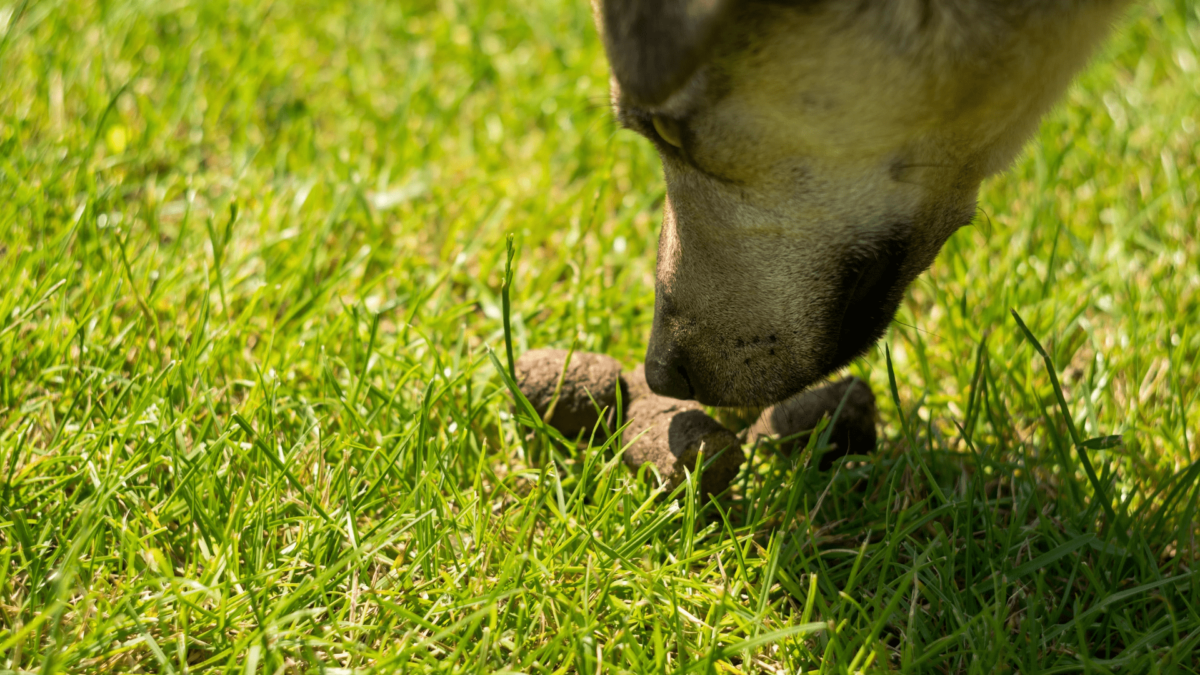
- Indiscriminate Eating:
- Dogs are notorious for their indiscriminate eating habits, sometimes called pica.
- They will eat almost anything that smells remotely interesting, regardless of whether it’s edible or not.
- This can include feces, which may have a strong smell that piques their curiosity.
- Strong Smell:
- Cat poop can have a particularly strong odor that may be appealing to dogs.
- This is because cats are obligate carnivores, meaning that their feces contain a lot of protein and other nutrients that dogs may find attractive.
- Learned Behavior by Watching Other Dogs:
- Dogs are social animals, and they learn a lot by observing other dogs, including both good and bad behaviors.
- If your dog has seen another dog eat feces, whether it’s from a cat’s litter box or another source, they might be inclined to mimic this action.
- Potential Risks:
- While coprophagia may be unpleasant for owners to witness, it is generally not harmful to the dog’s health, as long as the feces are free of parasites or other harmful pathogens.
- However, eating any poop carries the potential for the dog to contract harmful bacteria and parasites.
3. Why do dogs eat other dogs’ poop?
- Social Behavior: Dogs may mimic each other’s behaviors. If one dog eats poop, another might follow suit.
- Curiosity: Dogs explore their environment through their mouths. Poop is just another item to investigate.
How to Stop Dogs from Eating Poop: Home Remedies and Tips
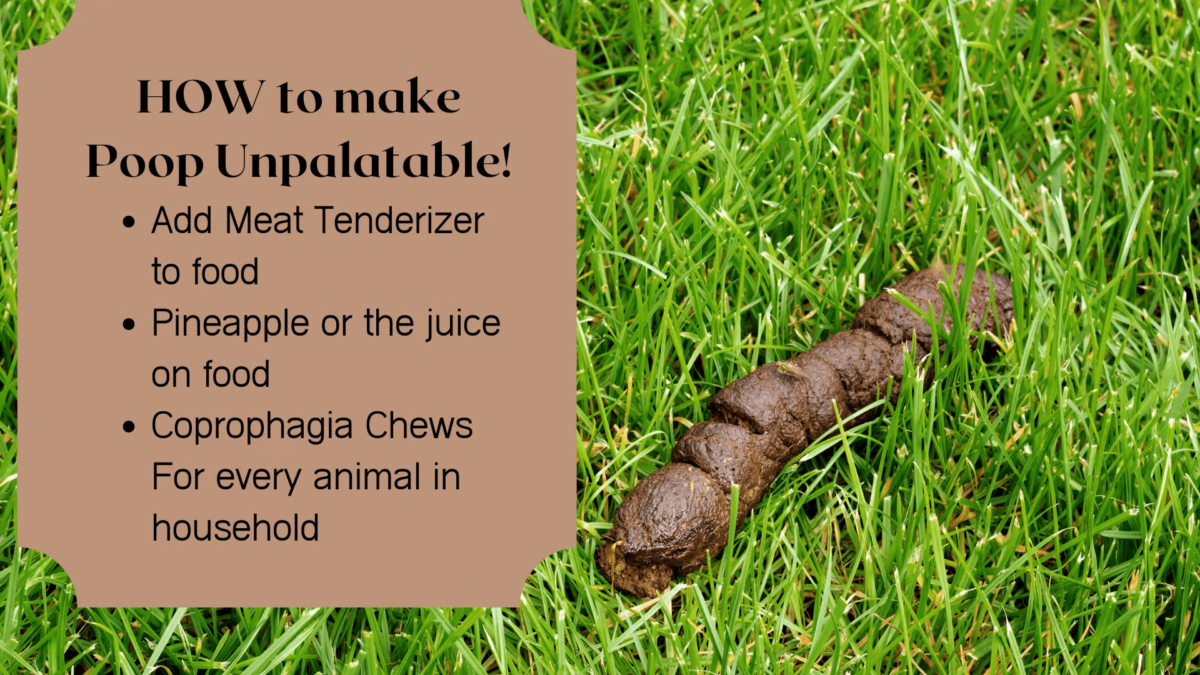
1. Coating Stools: Hot Sauce or Lemon Juice
- Why? The strong taste of hot sauce or lemon juice can deter your dog from approaching feces.
- How?
- Mix a small amount of hot sauce or freshly squeezed lemon juice with water.
- Spray or sprinkle this mixture on the poop in your yard.
- Be cautious not to use too much, as it should be unpleasant but not harmful to your dog.
2. Pumpkin Power: Adding Canned Pumpkin
- Why? Canned pumpkin is rich in fiber and can help regulate digestion.
- How?
- Add a few tablespoons of canned, unspiced pumpkin to your dog’s meals.
- The fiber content can make your dog’s tummy feel full and reduce the urge to eat poop.
3. Enzyme Treats and Digestive Aids
- Why? These treats contain enzymes that improve digestion and nutrient absorption.Some enzyme treats contain ingredients that help with protein digestion.
- These can be effective in preventing undigested protein remnants in the stool, which often make it appealing to dogs.
- How?
- Look for chewable enzyme treats specifically designed for dogs.
- Regular use can enhance overall digestion and reduce the appeal of feces.
4. Mineral Supplements: Correcting Imbalances
- Why? Some dogs eat poop due to mineral deficiencies.
- How?
- Consult your veterinarian to identify any specific mineral deficiencies.
- Consider adding appropriate mineral supplements to your dog’s diet.
5. Pineapple Trick: Making Poop Taste Unappealing
- Why? Pineapple contains an enzyme called bromelain, which alters the taste of poop.
- How?
- Offer small amounts of fresh pineapple as a treat.
- The altered taste may discourage your dog from eating feces.
6. Meat Tenderizer: Surprising Remedy
- Why? Meat tenderizer contains enzymes that break down proteins.
- How?
- Sprinkle a small amount of meat tenderizer on your dog’s food.
- It can make the poop taste very bad and discourage coprophagia.
7. Clean Up Promptly:
- After your dog has defecated, promptly scoop up the poop and dispose of it properly.
- Keeping the yard clean reduces the temptation for your dog to snack on feces.
8. Use Bitter-Tasting Sprays or Deterrents:
- Apply bitter-tasting sprays to areas where your dog tends to eat poop.
- These products discourage them from approaching feces.
9. Plenty of Toys and Playtime:
- Boredom can lead to coprophagia. Provide mental and physical stimulation through toys, games, and playtime.
Specific Types of Poop Eaten by Dogs
Why dogs eat rabbit poop?
- Clean Up Promptly:
- After your dog has defecated, promptly scoop up the poop and dispose of it properly.
- Keeping the yard clean reduces the temptation for your dog to snack on feces.
- Adding Something to Their Food:
- Pineapple can be used as a natural deterrent. It alters the taste of your dog’s feces, making it less appealing.
- Start with a small amount of freshly crushed pineapple (about 1/4 teaspoon per 10 pounds of body weight) and monitor for any adverse reactions.
- Chewable Enzyme Treats:
- Some enzyme treats contain ingredients that help with protein digestion.
- These can be effective in preventing undigested protein remnants in the stool, which often make it appealing to dogs.
- Getting Their Diet Right:
- Ensure your dog is on a balanced diet with sufficient nutrients.
- Consult your veterinarian to address any nutritional deficiencies.
- Use Bitter-Tasting Sprays or Deterrents:
- Apply bitter-tasting sprays to areas where your dog tends to eat poop.
- These products discourage them from approaching feces.
- Plenty of Toys and Playtime:
- Boredom can lead to coprophagia. Provide mental and physical stimulation through toys, games, and playtime.
Why Do Dogs Eat Chicken Poop?
Dogs engaging in coprophagia (eating their own or other animals’ feces) might seem bizarre to us, but it’s relatively common among our canine companions. Here are some key points about this behavior:
- Curiosity and Exploration:
- Dogs are curious creatures, especially puppies. They explore their environment using their mouths.
- Chicken poop might catch their attention due to its smell, texture, and novelty.
- Nutritional Instincts:
- Dogs have an innate drive to seek out nutrients.
- Chicken poop may contain undigested food particles, protein, and other elements that dogs find appealing.
- Boredom and Anxiety:
- Some dogs engage in coprophagia out of boredom or anxiety.
- Eating chicken poop might be a way to alleviate their restlessness.
- Learned Behavior:
- Dogs learn from observing other dogs. If they see another dog eating chicken poop, they might imitate the behavior.
- It can become a habit if reinforced by repetition.
- Potential Health Risks:
- While most healthy dogs may not suffer immediate harm from eating chicken poop, there are risks.
- Chicken poop can carry parasites like roundworms or giardia.
- Harmful bacteria (e.g., salmonella) may also be present.
- Prevention:
- Regularly clean up chicken poop from the yard to reduce access.
- Provide mental and physical stimulation to prevent boredom-driven coprophagia.
Remember that while this behavior might be puzzling, it’s essential to discourage it and prioritize your dog’s well-being. Consult your veterinarian if you notice any adverse effects. 🐾
Why Do Dogs Eat Deer Poop?
When dogs encounter deer droppings, they are exposed to a variety of scents from the deer’s diet, hormones, and digestive system. This unique combination can be highly enticing for your furry friend. Furthermore, dogs are instinctual attracted to wildlife and their byproducts.
While it may seem strange to us, there are several reasons why dogs engage in this behavior:
- Taste and Smell:
- One of the most common reasons why dogs eat deer poop is that they simply enjoy the taste and smell of it.
- Deer poop has a strong odor that can be attractive to dogs, especially those with a strong sense of smell.
- Additionally, deer poop may contain undigested bits of food that can make it more appealing to dogs.
- Boredom:
- Another reason why dogs may eat deer poop is out of boredom.
- Dogs that are left alone for long periods of time or that don’t get enough exercise may turn to eating feces as a way to pass the time or alleviate boredom.
- Hunger and Nutritional Instincts:
- If your dog is not getting enough food or is not receiving the necessary nutrients from their diet, they may turn to eating deer poop as a way to supplement their diet.
- This is especially true for dogs that are on a low-quality or poorly balanced diet.
- Attention-Seeking:
- Some dogs may eat deer poop as a way to get attention from their owners.
- If your dog knows that eating deer poop will get a reaction from you, they may continue to do it as a way to get attention.
Potential Risks and Diseases
While most healthy dogs may not suffer immediate harm from eating deer poop, there are risks associated with this behavior:
- Parasites and Bacteria:
- Deer poop can carry Salmonella and E. coli bacteria, among others.
- While no specific worms seem to pass from deer poop to dogs, it’s essential to monitor your dog’s behavior.
- Prevention and Training:
- Keep your dog on a leash when walking in areas where deer may be present.
- Train your dog to “leave it” or “drop it” when they encounter deer poop.
- Provide your dog with plenty of exercise and mental stimulation to prevent boredom.
- Ensure that your dog is getting enough food and the necessary nutrients from their diet.
By understanding why dogs eat deer poop and taking steps to prevent this behavior, you can help keep your dog healthy and happy. 🐾
Frequency and Timing of Dog’s Bowel Movements
Understanding your dog’s bowel movements is essential for their overall health and well-being. The frequency and timing of when dogs poop can vary based on factors such as age, diet, and individual differences. Let’s explore this topic in detail:
How Often Should Dogs Poop?
- Most adult dogs poop once a day on average, although some may go two or three times per day and still be considered normal.
- Puppies, on the other hand, tend to poop more frequently, often following a meal.
- Senior dogs may need to defecate less frequently, sometimes only once a day or even less.
Timing After Eating: How Long Does It Take?
- Food typically takes between 6 and 8 hours to pass through a dog’s digestive system.
- Therefore, dogs usually need around 7 hours after eating for a bowel movement.
- However, with puppies, this time is much shorter, potentially as little as 4 hours.
- Keep in mind that a poop after a meal might not necessarily be from that specific meal. It could include remnants from previous meals during the day.
Factors Affecting Digestion and Pooping:
- Type of Food:
- Wet food passes through the digestive system more quickly than dry food due to its high water content.
- Check the nutritional information on the can to see how much moisture the food contains.
- Digestibility:
- Highly digestible food results in less waste because dogs absorb more nutrients.
- Low-quality food with less than 75% digestibility may lead to more frequent pooping.
- Ingredients:
- The quality and type of ingredients affect digestion.
- Some foods, like fruit, can increase poop frequency.
Signs to Watch For:
- Consistency: Healthy poop should be compact, moist, and hold its shape.
- Color: Normal poop is mid-brown, like milk chocolate. Green or yellow poop may indicate issues.
- Changes: If your dog’s bathroom habits change significantly, consult your vet.
When to Be Concerned:
- No Bowel Movement: If your dog hasn’t pooped in over 24 to 36 hours, contact your veterinarian.
- Other Symptoms: Lethargy, vomiting, straining, or blood during defecation are concerning signs.
Off-the-Shelf Deterrents to Prevent Dogs from Eating Poop
Coprophagia, the habit of dogs eating their own or other animals’ feces, can be both perplexing and unpleasant for pet owners. Fortunately, there are commercial products specifically designed to discourage this behavior. These off-the-shelf deterrents aim to make poop taste bad, dissuading dogs from indulging in this unsavory habit. Let’s explore some of these products and how they work:

1. NaturVet Coprophagia Stool Eating Deterrent Soft Chews
- Overview: NaturVet is a trusted brand with almost 10,000 verified Amazon reviews. Their Coprophagia Stool Eating Deterrent Soft Chews are formulated to help stop stool eating.
- Ingredients:
- Enhanced with a unique blend of Yucca, Parsley, Chamomile, and a Proprietary Enzyme Blend.
- These ingredients work together to discourage dogs from consuming their own stool or other dogs’ stool.
- The blend also helps support the reduction of unpleasant pet odors while freshening your pet’s breath.
- Usage:
- Suitable for dogs over the age of 12 weeks.
- Administer as directed on the packaging.
2. Healthy Solutions Stool Eating Deterrent For Dogs, Plus Breath Freshener
- Best Overall Choice: Healthy Solutions No Stool Eating formula is effective in treating coprophagia in dogs.
- Ingredients:
- Enhanced with digestive enzymes, probiotics, and parsley to freshen your dog’s breath.
- These components contribute to making the dog’s waste less appealing.
- Usage:
- Consistent administration of this stool eating deterrent can help your dog overcome the habit within 30-60 days.
3. FOR-BID Coprophagia Deterrent
- Fastest Acting:
- FOR-BID is known for its rapid effectiveness in preventing coprophagia.
- It contains a substance that makes the feces taste extremely unappealing to dogs.
- Administer as directed to see quick results.
4. CoProvent Coprophagia Soft Chews
- Best Choice for Picky Eaters:
- CoProvent Coprophagia Soft Chews are specially formulated to address stool eating in dogs.
- Ideal for dogs that are selective about their food.
5. Pineapple Juice
- Home Deterrent:
- Pineapple juice is a natural option.
- Sprinkle it on your dog’s food to make the poop taste unappealing.
- Pineapple contains an enzyme called bromelain, which alters the taste.
6. PetNC Stool Eating Deterrent:
- These flavored tablets are designed to deter dogs from consuming their own feces. They contain natural ingredients that make poop less appealing to dogs. The key components include:
- Yucca schidigera: Helps reduce odors from stool and urine.
- Cayenne pepper: Imparts an “offensive” taste to discourage poop consumption.
- Glutamic acid: Makes stool taste bitter when mixed with stomach acids.
- Digestive enzymes: Alter the taste and odor of stool.
Solid Gold Stop Eating Poop:
- This product serves as both a deterrent and a digestive aid. It contains ingredients like parsley, yucca schidigera, chamomile, and probiotics. These components support your dog’s digestive health and make their waste less appealing to them.
6. Behavior Modification and Consistency
- Long-Term Method:
- Behavior modification, such as training your dog with commands like “leave it,” is essential.
- Consistency is key; follow the recommended dosage and be patient.
Remember that while these deterrents can help, addressing any underlying medical or behavioral issues is crucial. Consult your veterinarian to develop a comprehensive plan to stop this behavior.
Vitamins and supplements to reduce a dog’s tendency to eat poop
- Vitamin B1 (Thiamine):
- Vitamin B1 aids digestion and plays a role in the nervous system. Interestingly, a deficiency in thiamine can sometimes cause coprophagia in dogs. Ensuring an adequate intake of vitamin B1 can help prevent this behavior.
- Vitamin B12 (Cobalamin):
- Vitamin B12 is essential for nutrient absorption. By supporting proper digestion, it can indirectly discourage dogs from eating feces.
- Vitamin E:
- Vitamin E has anti-inflammatory properties and can help reduce inflammation in the gut. A healthier gut may lead to less interest in consuming poop.
- Probiotics:
- Probiotics balance the gut flora and promote overall digestive health. A well-functioning gut can reduce the likelihood of coprophagia.
- Digestive Enzymes:
- Digestive enzymes (such as cellulose, protease, amylase, and lipase) help break down food better. Improved digestion may discourage dogs from eating their own waste.
Remember to consult your veterinarian before introducing any supplements to your dog’s diet. They can assess your dog’s specific needs and recommend the most suitable approach. Consistency and patience are key when addressing this behavior. 🐶🙌
FAQS
How Much Pineapple to Give a Dog to Stop Eating Poop?
To effectively deter your dog from eating poop, you should give them a small, appropriate amount of pineapple. Experts suggest giving your dog about 1/4 teaspoon of freshly crushed pineapple, per 10 pounds of body weight, with each meal1. Always introduce new foods slowly to monitor for any adverse reactions.
How to clean dog’s mouth after eating poop?
To clean your dog’s mouth after it has eaten poop, follow these steps:
Wipe with a Clean Cloth:
Use a clean cloth or paper towel dampened with coconut oil or saltwater.
Gently wipe your dog’s mouth, including the gums, tongue, and roof of their mouth.
Brush Their Teeth:
Invest in a doggie toothbrush and dog-friendly toothpaste.
Brush your dog’s teeth carefully to remove any remaining residue.
Make sure to use toothpaste specifically formulated for dogs, as human toothpaste can be toxic to them.
Rinse with Water:
Offer your dog a bowl of water to rinse their mouth.
Encourage them to drink and swish the water around to further clean their mouth.
Why Is My Dog Eating Frozen Poop?
Dogs may eat frozen poop for several reasons:
Cleaning Instinct:
Dogs are naturally clean animals and may try to remove waste from their living area.
Eating frozen poop could be their way of tidying up.
Smell and Taste:
The smell or taste of the waste might attract dogs.
Their preferences differ from ours, so what’s repulsive to us isn’t necessarily so for them.
Nutritional Factors:
Some dogs eat poop due to nutritional deficiencies.
They might seek additional nutrients from frozen stools.
Remember to discourage this behavior and consult a veterinarian if it persists. 🐾
Will A Muzzle Stop My Dog From Eating Poop?
While some people believe that a muzzle will prevent dogs from eating poop by covering their nose and mouth, it’s not necessarily true. Dogs have a strong sense of smell and can still detect poop even with a muzzle on. However, using a well-fitting muzzle can help prevent this behavior and protect your dog’s health. 🐾
Stop Eating Poop Chews for Dogs
These chews are specially formulated products that deter dogs from consuming their own feces. They contain ingredients that make poop unappetizing to dogs, addressing the common yet undesirable behavior, and promoting overall health and hygiene.
Dog Eating Poop Pill
These pills serve a similar purpose as the chews, containing compounds that make feces taste unpleasant to dogs. Administered orally, they can be an effective solution for curbing this habit, ensuring the dog’s well-being and cleanliness.
What to Do if My Dog Eats Goose Poop
If a dog consumes goose poop, monitoring its health for signs of illness or distress is crucial. Consultation with a vet is advisable to address potential parasites or bacteria ingested, ensuring timely intervention and treatment if necessary.
Can Dogs Eat Horse Poop
While dogs might be attracted to horse poop due to its odor and taste, it isn’t advisable to let them consume it as it may contain harmful parasites or bacteria. Owners should discourage this behavior to maintain their dog’s health.
Coccidia in Dogs from Eating Rabbit Poop:
Coccidia infection can occur in dogs after ingesting rabbit feces contaminated with the parasite. Symptoms include diarrhea and vomiting; thus immediate veterinary care is essential for diagnosis and treatment, ensuring the dog’s recovery and health maintenance.
Can Dogs Get Parvo from Eating Cat Poop:
Although rare, there’s a risk of dogs contracting diseases like parvovirus from eating cat feces which might be contaminated. It’s vital for owners to prevent this behavior and ensure their pets are vaccinated and monitored for signs of illness.
















